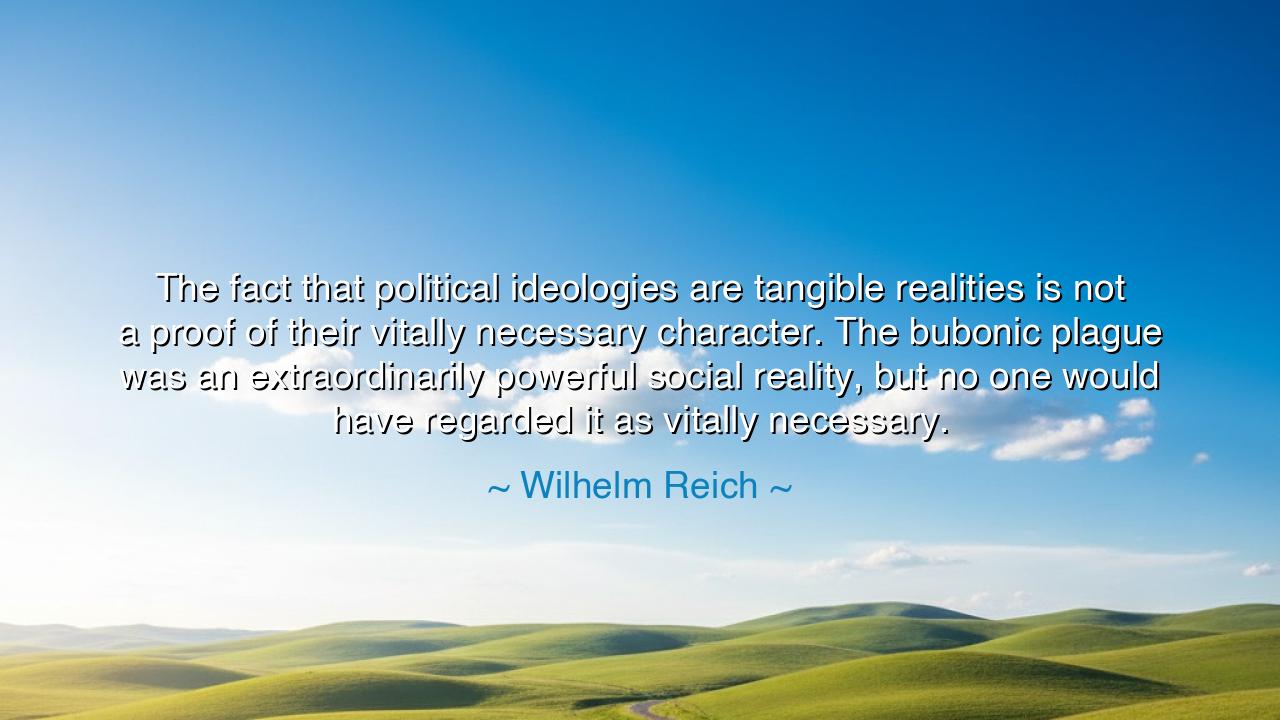
The fact that political ideologies are tangible realities is not
The fact that political ideologies are tangible realities is not a proof of their vitally necessary character. The bubonic plague was an extraordinarily powerful social reality, but no one would have regarded it as vitally necessary.






In an age when nations were torn between tyranny and revolution, when the banners of ideology swept across continents like raging storms, the psychoanalyst and philosopher Wilhelm Reich spoke words of piercing clarity: “The fact that political ideologies are tangible realities is not a proof of their vitally necessary character. The bubonic plague was an extraordinarily powerful social reality, but no one would have regarded it as vitally necessary.” In this, Reich stripped away the illusion that power and presence alone justify existence. He declared that not all things which dominate the world deserve to endure — that strength is not the same as righteousness, and that an idea’s reality does not sanctify its worth.
The origin of this quote lies in the dark mid-century of the twentieth, when the world was engulfed by totalitarian ideologies — fascism, communism, nationalism — each claiming to be the salvation of mankind, each leaving behind only chains and graves. Reich, once a student of Freud and later an exile hunted by Nazis, had seen firsthand how systems of thought could infect the minds of millions. He compared these ideologies not to noble creeds, but to diseases of the soul — forces that spread, mutate, and consume life. Like the bubonic plague, they were real, terrifyingly so, yet their very reality was proof not of their necessity, but of their danger.
What Reich meant was that truth and virtue cannot be measured by mere existence. A lie may be widespread; a delusion may rule a nation; an evil may endure for centuries — yet none of these are necessary to the well-being of humanity. The plague, too, was once a “tangible reality.” It filled cities with fear, changed economies, even reshaped faith and art. But no sane man would call it vital to civilization. So too with ideology — it may be powerful, it may command armies and dictate laws, but that does not make it just or natural. Reich’s insight tears down the arrogance of those who mistake the prevalence of a belief for its moral rightness.
History is filled with examples that prove his wisdom. Consider Nazi Germany, where ideology became a god and men became its priests. The Third Reich was indeed a “tangible reality” — it built monuments, moved millions, and dominated Europe for a time. Yet, like the plague, it destroyed everything it touched: truth, compassion, and life itself. It was powerful, but not necessary; real, but not righteous. When it perished, the world did not crumble — it breathed again. Thus, Reich’s warning becomes eternal: beware the ideas that claim necessity through dominance, for they are often the most toxic.
Even in our own time, his words remain a mirror to the human condition. New ideologies rise as old ones fall — political, cultural, and religious — each declaring itself indispensable, each demanding allegiance. But the wise must remember Reich’s lesson: necessity is measured by life, not by authority. The ideas that sustain love, justice, and creativity are those that nurture life; the ones that suffocate thought, sow division, and exalt power over truth are but modern plagues. A nation that confuses dominance with virtue will find itself enslaved not by tyrants alone, but by its own blindness.
Reich’s metaphor of the bubonic plague also reminds us that ideas, like diseases, spread through contagion. They thrive where fear and ignorance dwell, where people seek certainty at the cost of freedom. The cure, then, is not silence or suppression, but understanding — the courage to examine ideas, to test their fruits, to reject what poisons the soul. Education, dialogue, and moral courage are the medicine that keeps civilization alive. For just as the body must resist infection, so must the mind resist false gods of ideology.
Therefore, let this teaching be engraved upon the hearts of future generations: reality alone does not justify existence. The power of an idea is not proof of its goodness. Always ask: does this belief serve life, or does it destroy it? Does it free, or does it enslave? For the health of society, like the health of the body, depends upon what we allow to dwell within us. Let no ideology, however grand, claim holiness merely because it thrives; the weeds of falsehood grow fastest in the soil of power.
So take heed, seekers of truth: not all that is mighty is right, and not all that endures is sacred. As Reich warned, even the plague once ruled the world — yet its dominion brought only death. The true test of any philosophy, of any government, of any faith, is this: does it make humanity more whole, more free, more alive? If it does not, then let it perish as every pestilence must — cleansed by the sunlight of reason and the fire of the human spirit.






AAdministratorAdministrator
Welcome, honored guests. Please leave a comment, we will respond soon